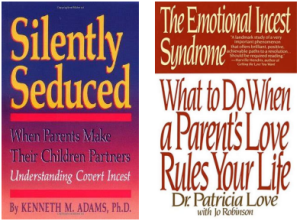One of our staff members is contributing considerably to a News Archiving service at Mu. Any well educated (Masters, PhD or above) users who wish to make comments on news sites, please contact Jim Burton directly rather than using this list, and we can work on maximising view count.
Covert incest: Difference between revisions
The Admins (talk | contribs) No edit summary |
The Admins (talk | contribs) No edit summary |
||
| Line 1: | Line 1: | ||
__NOTOC__[[File:Ciselfhelp.png|thumb|Classic self help titles in the covert incest genre]] | __NOTOC__[[File:Ciselfhelp.png|thumb|Classic self help titles in the covert incest genre]] | ||
'''Covert incest''' also known as '''emotional incest, psychic incest or parentification<ref>[https://www.psychologytoday.com/us/blog/healing-together/202001/14-signs-you-were-parentified-child PT - Parentification]</ref>''' is a highly questionable psychiatric concept from the 1980s and 90s, still used by therapists - many of them anti-incest [[Feminism|feminists]] and Jungians/Psychotherapists. The covert incest paradigm essentially pathologizes and sexualizes both functional and dysfunctional aspects of family life, and has been criticized as an attempt to [[Reification|reify]] novel forms of "abuse", unduly expanding the definition of [[Child Sexual Abuse]].<ref>[https://books.google.com/books?id=zZgSSh6L4HIC&pg=PA11&dq=+%22covert+incest%22&hl=en Pendergrast, Mark (1996). Victims of memory: sex abuse accusations and shattered lives, Hinesburg, Vt: Upper Access.]</ref><ref>Bjorklund, David F. (2000). False-memory creation in children and adults: theory, research, and implications, Hillsdale, N.J: L. Erlbaum.</ref><ref>Kaminer, Wendy (1993). I'm dysfunctional, you're dysfunctional: the recovery movement and other self-help fashions, New York: Vintage Books.</ref> | '''Covert incest''' also known as '''emotional incest, psychic incest or parentification<ref>[https://www.psychologytoday.com/us/blog/healing-together/202001/14-signs-you-were-parentified-child PT - Parentification]</ref>''' is a highly questionable psychiatric concept from the 1980s and 90s, still used as a grift by therapists<ref>[https://www.healthline.com/health/emotional-incest Healthline pushing "Emotional Incest" therapy]</ref> - many of them anti-incest [[Feminism|feminists]] and Jungians/Psychotherapists. The covert incest paradigm essentially pathologizes and sexualizes both functional and dysfunctional aspects of family life, and has been criticized as an attempt to [[Reification|reify]] novel forms of "abuse", unduly expanding the definition of [[Child Sexual Abuse]].<ref>[https://books.google.com/books?id=zZgSSh6L4HIC&pg=PA11&dq=+%22covert+incest%22&hl=en Pendergrast, Mark (1996). Victims of memory: sex abuse accusations and shattered lives, Hinesburg, Vt: Upper Access.]</ref><ref>Bjorklund, David F. (2000). False-memory creation in children and adults: theory, research, and implications, Hillsdale, N.J: L. Erlbaum.</ref><ref>Kaminer, Wendy (1993). I'm dysfunctional, you're dysfunctional: the recovery movement and other self-help fashions, New York: Vintage Books.</ref> | ||
==Basis== | ==Basis== | ||
Revision as of 22:12, 24 September 2022

Covert incest also known as emotional incest, psychic incest or parentification[1] is a highly questionable psychiatric concept from the 1980s and 90s, still used as a grift by therapists[2] - many of them anti-incest feminists and Jungians/Psychotherapists. The covert incest paradigm essentially pathologizes and sexualizes both functional and dysfunctional aspects of family life, and has been criticized as an attempt to reify novel forms of "abuse", unduly expanding the definition of Child Sexual Abuse.[3][4][5]
Basis
In concept, covert incest is abuse in which a parent looks to their child for the emotional support that would normally be provided by another adult. While the activities involved are not sexual, the effects of covert incest on children when they become adults are said to mimic actual incest, although sometimes to a lesser degree. Psychotherapist Roni Weisberg-Ross has noted that the term may not be particularly useful, since it can lead to attributing nearly any possible dysfunctional relationship or problem, becoming "a catchall, watered-down diagnosis". Ross also criticizes the term for its emphasis on children meeting parents' "unmet needs", noting that children often meet the emotional or other needs of parents, with relationship boundaries frequently blurring and no definition of when this leads to permanent damage or harm.[6] In the case of "parentification" scholars now also claim that the phenomenon can be "adaptive" in order to explain diversity among behaviors they have arbitrarily pathologized.
See also
External Links
- The Fiction of Covert Incest - Medium.
Sympathetic literature
- Covert incest - The Wikipedia article has not yet been touched by psychiatry skeptics. Various sources listed.
- Parentification - Modern sanitization of "covert/psychic incest". Similarly, the idea has been under-investigated by skeptics.
- Marion Woodman - Example of a scholar/pseudoscientist who promoted the concept.
- PsychCentral Explainer
References
- ↑ PT - Parentification
- ↑ Healthline pushing "Emotional Incest" therapy
- ↑ Pendergrast, Mark (1996). Victims of memory: sex abuse accusations and shattered lives, Hinesburg, Vt: Upper Access.
- ↑ Bjorklund, David F. (2000). False-memory creation in children and adults: theory, research, and implications, Hillsdale, N.J: L. Erlbaum.
- ↑ Kaminer, Wendy (1993). I'm dysfunctional, you're dysfunctional: the recovery movement and other self-help fashions, New York: Vintage Books.
- ↑ Weisberg-Ross, Roni (January 1, 2012). "Covert/Emotional Incest - How Real Is It?". Ezine.